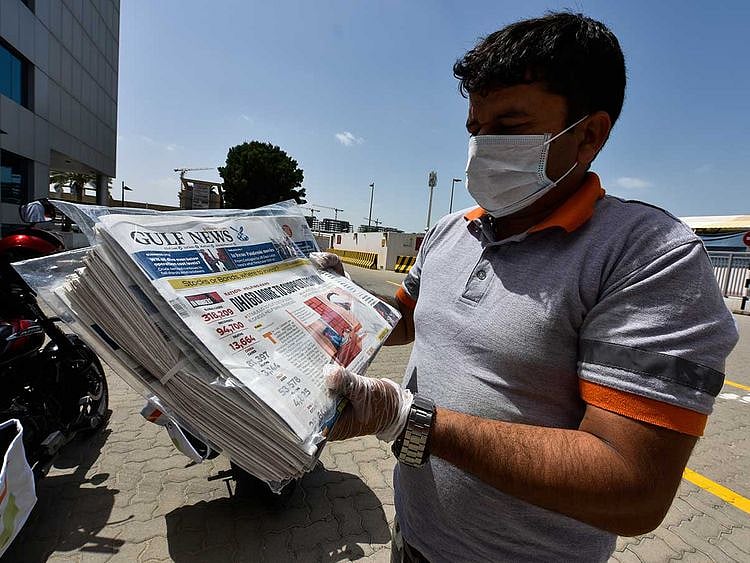For 20 years, traditional journalism has defied the gloomy predictions that it was dying. Pessimists have for long dismissed journalism as a dying profession as ‘new age media’, such as online aggregators and social media networks, began to attract massive audiences around the world.
Newspapers survived. Some even thrived. But the struggle today is of a different magnitude. And it is somehow ironic, as I have been wondering over the past two months. Could the biggest story newspapers have ever covered be the one that is going to kill them?
The coronavirus outbreak has impacted almost every aspect of our lives. It has devastated economies, shut down entire countries. The world has become one big prison; people are confined to their homes. Companies and retail stores closed their doors; henceforth, they are not advertising in newspapers.
The painful loss of advertising revenue
Newspapers have thus been losing their main income as advertising vanished overnight. Print copies have also been reduced for three reasons: the increasing inability of delivering them to the subscribers’ doorsteps as the pandemic containment measures made movement difficult; retail stores where newspapers are sold have been closed and due to the official instructions to restrict the number of print copies on the streets to avoid the risk of virus transmission through the printed newspaper.
Nevertheless, news consumption has surged dramatically during the crisis, mainly online, which led to doubling the efforts of newsrooms. For example, in Gulf News, every staff member is working on something related to the coronavirus. People want to read about it; they want to know the latest updates, the latest news from around the world, especially their home countries. They look for health tips from specialists and authorised entities to advise them on how to stay and keep their families safe. They want to be informed on the latest government instructions related to the COVID-19 crisis.
Therefore, the crisis has been a two-edged sword for the media. On the one hand, the news consumption increased dramatically, but the actual sale of newspaper print copies significantly declined as people turn to the online newspapers for the latest information and news as they stay home.
The fact is that in the news industry, the main income is the print side of the newspaper business. The traditional media has indeed been losing momentum in the past few years with the rise of digital platforms and social media, but in some regions, newspapers continued to thrive, and in some countries, the print subscription continued to rise, particularly in Asia and parts of the United States. Many new titles joined the industry in the last ten years.
But we cannot escape the current frightening reality. One question on everybody’s mind today as humanity battles the pandemic, is: will traditional journalism survive the biggest story it has ever covered in our times?
The news industry is an economic activity. It is, of course, a business of a different kind; has a different business model than the usual business entities around us. Newspapers inform and educate. They tend to be the voice of the people, listen to their problems and report on their issues, concerns and hopes and reflect their aspirations of a better life. Newspapers are also a platform by which governments reach out to people. Nevertheless, they are ultimately a business like any other business — they must have a running income to survive and keep the news cycle alive.
Media's critical role in society
Like most business sectors during this crisis, the media has been affected badly. As the coronavirus outbreak continues to shatter the global economy, companies laid off millions of employees; millions of workers around the world have been forced to take unpaid leave or salary cuts. Governments, including the UAE, have set aside massive financial stimulus packages to mitigate the economic risk and aid struggling economic sectors, especially the private sector. The media should be part of that plan.
The media has a critical role to play. It is the reflection of societies. During this crisis, newspapers are doing their share to support the national efforts to combat the outbreak. Like the unsung heroes who work behind the scenes to fight the pandemic — doctors, nurses medical volunteers, security services, and many others who work tirelessly to keep everybody safe — newspapers have been working around the clock to perform their vital role to inform and spread awareness, to ensure the right information reaches the millions of readers, to refute rumours and deliver the right, reliable and credible message.
Also Read
COVID-19: The media in the time of the coronavirusThe newspaper is an immortal emotionHabits that are hard to breakPrint media is not dead but it must evolve: expertsThousands of journalists work from offices and homes to make sure we are informed. They are part of the national effort to combat COVID-19 to keep the nation safe and healthy. And to continue to do this critical job, newspapers are in dire need of support, the way all essential businesses do.
The media around the world is struggling. Can the news industry can survive the pandemic or will this unprecedented crisis will lead to the extinction of one of the major industries in the world, the traditional media?
The news industry survived against all the odds in the past two decades with the digital onslaught and the rise of the Twitters and Facebooks. But with this crisis, the industry has entered uncharted waters.
Sign up for the Daily Briefing
Get the latest news and updates straight to your inbox
Network Links
GN StoreDownload our app
© Al Nisr Publishing LLC 2026. All rights reserved.
